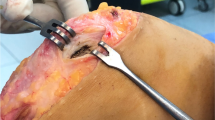Abstract
Purpose
Medial patellofemoral ligament (MPFL) reconstruction is performed to treat recurrent patellar dislocation (RPD). However, the effectiveness of MPFL reconstruction in patients with a severely lateralised tibial tuberosity remains unknown. In this study, the clinical outcomes of MPFL reconstruction in patients with an increased tibial tuberosity–trochlear groove (TT–TG) distance were examined.
Methods
A total of thirty-four patients who underwent MPFL reconstruction for RPD were retrospectively examined. Nineteen patients with a TT–TG distance of >20 mm (increased TT–TG distance group) were compared with 15 patients with a TT–TG distance of <20 mm (control group). Clinical outcomes of MPFL reconstruction were evaluated by occurrence of re-dislocation, Crosby and Insall grading system, apprehension sign, and Kujala and Lysholm scores.
Results
None of the patients reported re-dislocation. Apprehension sign remained in three patients in the increased TT–TG distance group and in one patient in the control group. According to the Crosby and Insall grading system, 9 patients (47 %) were excellent, 9 (47 %) were good, and 1 (5 %) was fair to poor in the increased TT–TG distance group, while 6 (40 %) were excellent and 9 (60 %) were good in the control group. Kujala and Lysholm scores were significantly improved post-operatively in both groups. No significant correlations were observed between TT–TG distance and post-operative Kujala or Lysholm score.
Conclusion
Overall clinical outcomes of MPFL reconstruction were favourable even in patients with an increased TT–TG distance. TT–TG distance of >20 mm may not be an absolute indication for medialisation of the tibial tuberosity when performing MPFL reconstruction.
Level of evidence
Case–control study, Level III.


Similar content being viewed by others
References
Ahmad CS, Stein BE, Matuz D, Henry JH (2000) Immediate surgical repair of the medial patellar stabilizers for acute patellar dislocation. A review of eight cases. Am J Sports Med 28:804–810
Amis AA, Firer P, Mountney J, Senavongse W, Thomas NP (2003) Anatomy and biomechanics of the medial patellofemoral ligament. Knee 10:215–220
Balcarek P, Jung K, Ammon J, Walde TA, Frosch S, Schuttrumpf JP, Sturmer KM, Frosch KH (2010) Anatomy of lateral patellar instability: trochlear dysplasia and tibial tubercle-trochlear groove distance is more pronounced in women who dislocate the patella. Am J Sports Med 38:2320–2327
Balcarek P, Jung K, Frosch KH, Sturmer KM (2011) Value of the tibial tuberosity–trochlear groove distance in patellar instability in the young athlete. Am J Sports Med 39:1756–1761
Buckens CF, Saris DB (2010) Reconstruction of the medial patellofemoral ligament for treatment of patellofemoral instability: a systematic review. Am J Sports Med 38:181–188
Camp CL, Stuart MJ, Krych AJ, Levy BA, Bond JR, Collins MS, Dahm DL (2013) CT and MRI measurements of tibial tubercle-trochlear groove distances are not equivalent in patients with patellar instability. Am J Sports Med 41:1835–1840
Colvin AC, West RV (2008) Patellar instability. J Bone Joint Surg Am 90:2751–2762
Conlan T, Garth WP Jr, Lemons JE (1993) Evaluation of the medial soft-tissue restraints of the extensor mechanism of the knee. J Bone Joint Surg Am 75:682–693
Dejour H, Walch G, Nove-Josserand L, Guier C (1994) Factors of patellar instability: an anatomic radiographic study. Knee Surg Sports Traumatol Arthrosc 2:19–26
Desio SM, Burks RT, Bachus KN (1998) Soft tissue restraints to lateral patellar translation in the human knee. Am J Sports Med 26:59–65
Dietrich TJ, Betz M, Pfirrmann CW, Koch PP, Fucentese SF (2014) End-stage extension of the knee and its influence on tibial tuberosity–trochlear groove distance (TTTG) in asymptomatic volunteers. Knee Surg Sports Traumatol Arthrosc 22:214–218
Elias DA, White LM, Fithian DC (2002) Acute lateral patellar dislocation at MR imaging: injury patterns of medial patellar soft-tissue restraints and osteochondral injuries of the inferomedial patella. Radiology 225:736–743
Fisher B, Nyland J, Brand E, Curtin B (2010) Medial patellofemoral ligament reconstruction for recurrent patellar dislocation: a systematic review including rehabilitation and return-to-sports efficacy. Arthroscopy 26:1384–1394
Hautamaa PV, Fithian DC, Kaufman KR, Daniel DM, Pohlmeyer AM (1998) Medial soft tissue restraints in lateral patellar instability and repair. Clin Orthop Relat Res 349:174–182
Howells NR, Barnett AJ, Ahearn N, Ansari A, Eldridge JD (2012) Medial patellofemoral ligament reconstruction: a prospective outcome assessment of a large single centre series. J Bone Joint Surg Br 94:1202–1208
Izadpanah K, Weitzel E, Vicari M, Hennig J, Weigel M, Südkamp NP, Niemeyer P (2013) Influence of knee flexion angle and weight bearing on the tibial tuberosity–trochlear groove (TTTG) distance for evaluation of patellofemoral alignment. Knee Surg Sports Traumatol Arthrosc. doi:10.1007/s00167-013-2537-5
Lustig S, Servien E, Selmi TAS, Neyret P (2006) Factors affecting reliability of TT–TG measurements before and after medialization: a CT-scan study. Rev Chir Orthop Rep Appar Mot 92:429–436 (in French)
Matsushita T, Kuroda R, Araki D, Kubo S, Matsumoto T, Kurosaka M (2013) Medial patellofemoral ligament reconstruction with lateral soft tissue release in adult patients with habitual patellar dislocation. Knee Surg Sports Traumatol Arthrosc 21:726–730
Nelitz M, Dreyhaupt J, Reichel H, Woelfle J, Lippacher S (2013) Anatomic reconstruction of the medial patellofemoral ligament in children and adolescents with open growth plates: surgical technique and clinical outcome. Am J Sports Med 41:58–63
Nomura E, Horiuchi Y, Inoue M (2002) Correlation of MR imaging findings and open exploration of medial patellofemoral ligament injuries in acute patellar dislocations. Knee 9:139–143
Panagiotopoulos E, Strzelczyk P, Herrmann M, Scuderi G (2006) Cadaveric study on static medial patellar stabilizers: the dynamizing role of the vastus medialis obliquus on medial patellofemoral ligament. Knee Surg Sports Traumatol Arthrosc 14:7–12
Pandit S, Frampton C, Stoddart J, Lynskey T (2011) Magnetic resonance imaging assessment of tibial tuberosity–trochlear groove distance: normal values for males and females. Int Orthop 35:1799–1803
Parikh SN, Nathan ST, Wall EJ, Eismann EA (2013) Complications of medial patellofemoral ligament reconstruction in young patients. Am J Sports Med 41:1030–1038
Pennock AT, Alam M, Bastrom T (2014) Variation in tibial tubercle-trochlear groove measurement as a function of age, sex, size, and patellar instability. Am J Sports Med 42:389–393
Petri M, von Falck C, Broese M, Liodakis E, Balcarek P, Niemeyer P, Hofmeister M, Krettek C, Voigt C, Haasper C, Zeichen J, Frosch KH, Lill H, Jagodzinski M (2013) Influence of rupture patterns of the medial patellofemoral ligament (MPFL) on the outcome after operative treatment of traumatic patellar dislocation. Knee Surg Sports Traumatol Arthrosc 21:683–689
Quirbach S, Smekal V, Rosenberger RE, El Attal R, Schöttle PB (2012) Anatomical double-bundle reconstruction of the medial patellofemoral ligament with a gracilis autograft. Oper Orthop Traumatol 24:131–139
Sallay PI, Poggi J, Speer KP, Garrett WE (1996) Acute dislocation of the patella. A correlative pathoanatomic study. Am J Sports Med 24:52–60
Sanders TG, Morrison WB, Singleton BA, Miller MD, Cornum KG (2001) Medial patellofemoral ligament injury following acute transient dislocation of the patella: MR findings with surgical correlation in 14 patients. J Comput Assist Tomogr 25:957–962
Schöttle PB, Zanetti M, Seifert B, Pfirrmann CW, Fucentese SF, Romero J (2006) The tibial tuberosity–trochlear groove distance: a comparative study between CT and MRI scanning. Knee 13:26–31
Schöttle PB, Fucentese SF, Romero J (2005) Clinical and radiological outcome of medial patellofemoral ligament reconstruction with a semitendinosus autograft for patella instability. Knee Surg Sports Traumatol Arthrosc 13:516–521
Shah JN, Howard JS, Flanigan DC, Brophy RH, Carey JL, Lattermann C (2012) A systematic review of complications and failures associated with medial patellofemoral ligament reconstruction for recurrent patellar dislocation. Am J Sports Med 40:1916–1923
Smith TO, Walker J, Russell N (2007) Outcomes of medial patellofemoral ligament reconstruction for patellar instability: a systematic review. Knee Surg Sports Traumatol Arthrosc 15:1301–1314
Tanaka MJ, Bollier MJ, Andrish JT, Fulkerson JP, Cosgarea AJ (2012) Complications of medial patellofemoral ligament reconstruction: common technical errors and factors for success: AAOS exhibit selection. J Bone Joint Surg Am 94:e87
Tecklenburg K, Feller JA, Whitehead TS, Webster KE, Elzarka A (2010) Outcome of surgery for recurrent patellar dislocation based on the distance of the tibial tuberosity to the trochlear groove. J Bone Joint Surg Br 92:1376–1380
Tjoumakaris FP, Forsythe B, Bradley JP (2010) Patellofemoral instability in athletes: treatment via modified Fulkerson osteotomy and lateral release. Am J Sports Med 38:992–999
Wagner D, Pfalzer F, Hingelbaum S, Huth J, Mauch F, Bauer G (2013) The influence of risk factors on clinical outcomes following anatomical medial patellofemoral ligament (MPFL) reconstruction using the gracilis tendon. Knee Surg Sports Traumatol Arthrosc 21:318–324
White BJ, Sherman OH (2009) Patellofemoral instability. Bull NYU Hosp Jt Dis 67:22–29
Wilcox JJ, Snow BJ, Aoki SK, Hung M, Burks RT (2012) Does landmark selection affect the reliability of tibial tubercle-trochlear groove measurements using MRI? Clin Orthop Relat Res 470:2253–2260
Author information
Authors and Affiliations
Corresponding author
Rights and permissions
About this article
Cite this article
Matsushita, T., Kuroda, R., Oka, S. et al. Clinical outcomes of medial patellofemoral ligament reconstruction in patients with an increased tibial tuberosity–trochlear groove distance. Knee Surg Sports Traumatol Arthrosc 22, 2438–2444 (2014). https://doi.org/10.1007/s00167-014-2919-3
Received:
Accepted:
Published:
Issue Date:
DOI: https://doi.org/10.1007/s00167-014-2919-3




